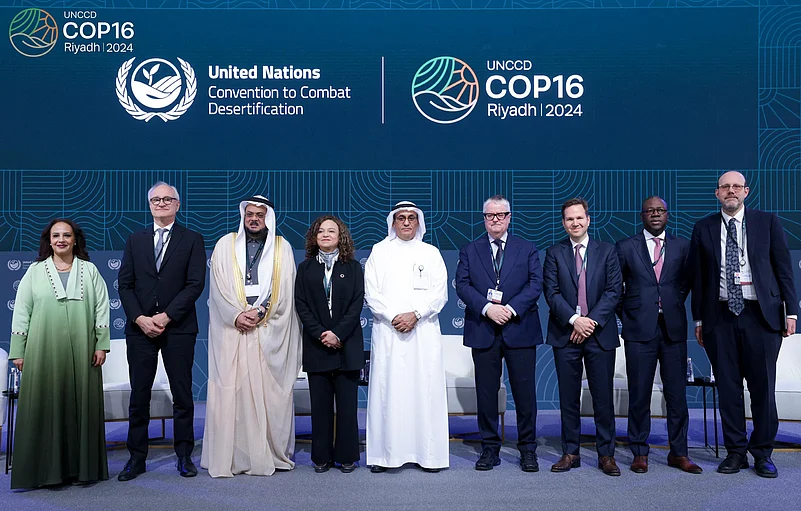The 16th session of the Conference of Parties (COP16) of the United Nations Convention to Combat Desertification (UNCCD) ended on December 13 in Riyadh, Saudi Arabia, with the 197 parties failing to strike a collective agreement on how to tackle land degradation, desertification and drought.
The failed negotiations come in the aftermath of three other global conferences that have fallen short of expectations: the Busan conference on plastic pollution, Baku COP29 meeting and the Cali conference on biodiversity. Recent global climate negotiations have been drawing the ire of several activists, faced with back-to-back disappointments over outcomes, which many feel fall short of expectations.
At the Riyadh conference, African countries had hoped for an agreement on a binding protocol on droughts to ensure that “every government will be held responsible” for devising stronger preparation and response plans, a delegate from an African country told AFP.
Indigenous groups were also pushing for a binding protocol, Praveena Sridhar, chief technical officer for Save Soil, a global campaign backed by UN agencies told AFP.
However, the Riyadh conference could not reach an agreement on a global drought regime. UNCCD stated in a press release, “Nations also made significant progress in laying the groundwork for a future global drought regime, which they intend to complete at COP17 in Mongolia in 2026.”
Meanwhile, over $12 billion was pledged to tackle desertification, land degradation and drought around the world, especially in the most vulnerable countries, the release mentioned.
Among the major outcomes were the launch of a prototype of the International Drought Resilience Observatory, an AI-driven platform to help countries cope with extreme droughts, mobilisation of the private sector under the Business4Land initiative, and creation of designated caucuses for indigenous peoples and for local communities.
Busan Negotiations: No Agreement on Plastic Treaty
The fifth meeting of the Intergovernmental Negotiating Committee (INC-5) held in Busan, South Korea, from November 25 to December 1 also failed to achieve a binding agreement on addressing the global challenge of plastic pollution.
Negotiations failed to resolve years-long divisions between “high-ambition” countries and “like-minded” nations, with the former pushing for a globally binding agreement to limit plastic production and a phase out of harmful chemicals, and the “like-minded” nations prioritising improved waste management and recycling.
The like-minded group of countries, including Saudi Arabia, Iran, Russia and other major oil producers, for whom plastic offers a rapidly growing market, pushed back against ambitious proposals. The economic threats to industries reliant on plastics prevented the group from agreeing on a treaty limiting plastic production.
Negotiations also sparked concerns for reportedly preventing indigenous people from accessing the closed-door negotiations.
The INC-5 members decided to reconvene in 2025 to discuss production caps, funding for recycling programmes and the list of chemicals that need to be phased out.
Finance COP: Not Enough Money for Developing Countries
The Baku conference (COP29), dubbed as the "Finance Cop", also concluded with a divide between developed and developing nations as a $300-billion pledge was deemed inadequate to meet the requirements of vulnerable nations facing with worst impacts of climate change. Developing nations and small island developing countries had already pegged the net requirement at $1.3 trillion.
The New Collective Quantified Goal on Climate Finance (NCQG) of $300 billion drew sharp criticism from the Global South with India calling it an ‘optical illusion’. For several stakeholders, the $1.3-trillion demand was a must, a non-negotiable, if the world was to commit to meeting the 2015 Paris Agreement targets.
Achieving consensus on a global scale has always been an uphill climb, fraught with contestations and conflicting interests, but with increasing geopolitical frictions, the challenges have been escalating.
Meanwhile, there are plenty of signs for urgent action. According to the 2024 UN Emissions Gap report, for instance, the world is currently on track for a 3.1 degrees Celsius warming by the end of this century. The World Meteorological Organization has estimated 2024 to be the warmest year on record, surpassing 2023.




























